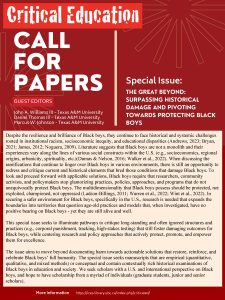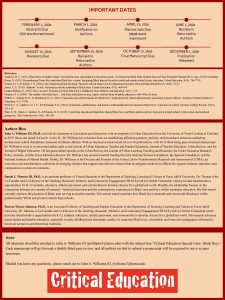
Special Issue Call: Neoliberal Capitalism and Public Education
Special Issue Editor:
Lana Parker
Associate Professor, Education University of Windsor, Canada Lana.parker@uwindsor.ca
The Status of Public Education: Documenting Neoliberal Capitalism’s Harms and Advocating for the Common Good
Overview and Aims:
“The mode of production of material life conditions the general process of social, political and intellectual life. It is not the consciousness of men that determines their existence, but their social existence that determines their consciousness.” (Marx, 1859/1977)
Seen as a common or public good, public education offers the foundation for a more equal, just, and democratic society. As Biesta and Säfström (2023) suggest, “public education can be seen as the expression of the democratic values of liberty, equality, and solidarity. … [It has also] played a key role in promoting and sustaining these values” (Public education and the rise of neoliberalism section, emphasis in original). In this vein, a well-funded public school offers opportunities for community, fellowship, ethical relationality, and the development of critical, creative capacities (Parker, 2021, 2023a, 2023b). An economically healthy public system is marked, among other things, by: small class sizes; good teacher wages and the high levels of teacher training attendant to those wages; rich and diverse programming for all students; resources and infrastructure in good repair; and, most significantly, independence from market interests and from reliance on private sources of revenue.
Despite this underlying potential, however, any defense of education as a public good must resist nostalgia, ahistoricism, or conservativism. That is, though public education holds promise, it has also often been rooted in material, cultural, and ideological conditions of exclusion (Nelson et al., 2022). As such, public education as a common good, and the related argument against privatization, must include two parallel, though not mutually exclusive, understandings: First, that the legacy of public education in many countries has often been unjust in its implementation. Second, that although as a system it has been imperfect in its practice of equality and justice, it still represents the most powerful foundation from which to seek and improve these aims.
Decades of neoliberal capitalism have had a corrosive effect on public education systems around the world. Peters (2021) notes that one of the guiding objectives of neoliberalism is to displace the idea of public goods with the notion of public choice. This permits the entry of market ideals, profit motives, and choice through every facet of educational systems and policies. For example,
the neoliberal belief that public education funding is inefficient permits systematic and prolonged underfunding and diversions of tax-payer dollars to private schools. Neoliberal perceptions of choice and the focus on the individual versus the collective serve to similarly undermine arguments for public education for all. Further, the very premise of education — the answer to the fundamental question of what is education for? — has been reshaped by neoliberal values of economic competition and unmitigated capitalist growth. In all, scholars have documented that neoliberalism in education influences all education policy, curriculum, and pedagogy, as well as refashions the underlying economic fiscal supports that uphold the public system.
What is sometimes obscured, and perhaps increasingly so as neoliberalism enjoins neoconservative ideologies, is that the underlying mechanism of neoliberal capitalism is economic. Its project has been about converting previously public goods into terrain for marketization and competition, with an emphasis on generating profits that are concentrated into the hands of a few. As such, this special issue will focus on revealing neoliberal capitalist policies and critiquing the material conditions of inequality, impoverishment, and austerity that these shifts have produced; it is also aimed at advocacy for well-funded public education as a common good worth protecting.
Description of Invited Articles:
For this issue, I invite analysis that foregrounds a critique of the contemporary expression of neoliberal capitalism. I seek submissions from a range of interdisciplinary perspectives (e.g., from within education, but also from public policy studies, progressive economics, sociology, philosophy, and more) to substantively engage with the material and philosophical challenges wrought by a neoliberal, capitalist totality, as it operates on education. A prevailing theme will be how this totality has produced harms for public education as a public good. Papers can be philosophical, theoretical, or conceptual; they can also be empirical, with methodologies such as Critical Policy Analysis, Critical Discourse Analysis, and the like. Some of the questions that you may wish to engage include:
- What are the material harms that have been produced in classrooms as a result of underfunding and austerity budgets?
- What are the changing economic underpinnings of public education? How has public spending changed and privatization increased?
- Neoliberalism presumes one set of goals and accountability measures for public education systems. What alternative goals and measures could be considered?
- How has neoliberal capitalism impoverished conceptions of public education’s purpose?
- What might an anti-capitalist education look like?
Timeline:
Manuscripts due to Editor: January 31, 2024 Manuscripts under review: February 1 – March 15, 2024
Manuscripts returned to authors for revision: March 31, 2024 Final Manuscripts due to Co-editors: April 30, 2024 Publication of Special Issue: May 31, 2024
About the Editor:
The special issue editor, Lana Parker, is an Associate Professor of Education at the Faculty of Education at the University of Windsor, Canada. She has expertise employing philosophical methods and critical discourse tools to analyze neoliberal trends in education. Her work interrogates these trends in contrast with the possibilities of ethical, responsible, and responsive pedagogy. She served as the Editor for the Journal of Teaching and Learning for three years. Her nationally funded research includes a phenomenological analysis of how capitalism and social media shape how youth engage with information, including mis- and disinformation, which is reflected in her recently published edited collection, Education in the Age of Misinformation: Philosophical and Pedagogical Explorations. In addition, Lana is a co-investigator on the Public Exchange Project, which exposes neoliberal trends of privatization in the Canadian context.
About Critical Education:
Critical Education is an international, refereed, open access journal published by the Institute for Critical Education Studies (ICES). Contributions critically examine contemporary education contexts, practices, and theories. Critical Education publishes theoretical and empirical research as well as articles that advance educational practices that challenge the existing state of affairs in society, schools, higher education, and informal education. ICES, Critical Education, and its companion publication Workplace: A Journal for Academic Labor, defend the freedom, without restriction or censorship, to disseminate and publish reports of research, teaching, and service, and to express critical opinions about institutions or systems and their management. Co-Directors of ICES, co-Hosts of ICES and Workplace blogs, and co-Editors of these journals resist all efforts to limit the exercise of academic freedom and intellectual freedom, recognizing the right of criticism by authors or contributors.
Author Guidelines: https://ices.library.ubc.ca/index.php/criticaled/about/submissions
References
Biesta, G., & Säfström, C. A. (2023). Introduction: The publicness of education. In G. Biesta &
C. A. Säfström (Eds.), The new publicness of education (pp. 1-7). Routledge. Marx, K. (1977). A contribution to the critique of political economy. Progress Publishers. (Original work published 1859)
Nelson, C., Broom, S., Sisaket, L., & Orphan, C. (2022). Imagining decolonial desires of the public good. International Journal of Qualitative Studies in Education, 35(5), 456–477.
Parker, L. (2021). Literacy in the post-truth era: The significance of affect and the ethical encounter. Educational Philosophy and Theory, 53(6), 613-623.
Parker, L. (2023a). Education in the age of misinformation: An afterword. In L. Parker (Ed.), Education in the age of misinformation: Philosophical and pedagogical explorations (pp. 251-256). Palgrave Macmillan.
Parker, L. (2023b). Making the most of it: Thinking about educational time with Hägglund and Levinas. Journal of Philosophy of Education. https://doi.org/10.1093/jopedu/qhad067
Peters, M. A. (2021). Neoliberalism as political discourse: The political arithmetic of homo oeconomicus. In M. Sardoč (Ed.), The impacts of neoliberal discourse and language in education (pp. 69-85). Routledge.



 Follow
Follow
